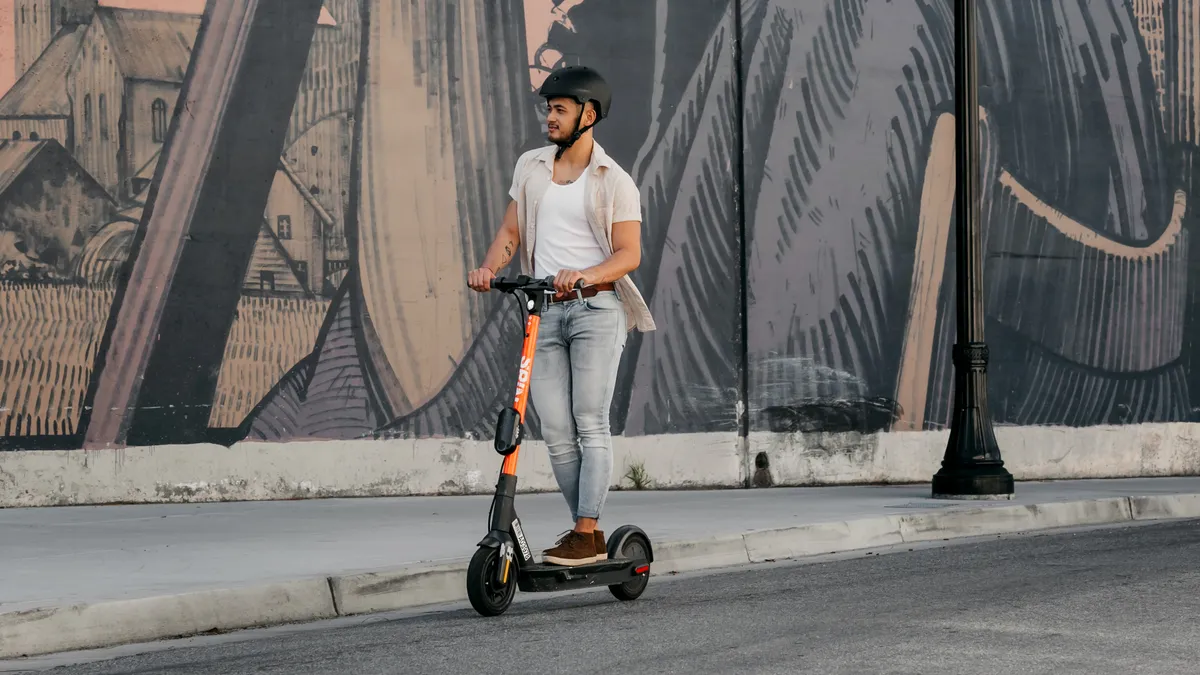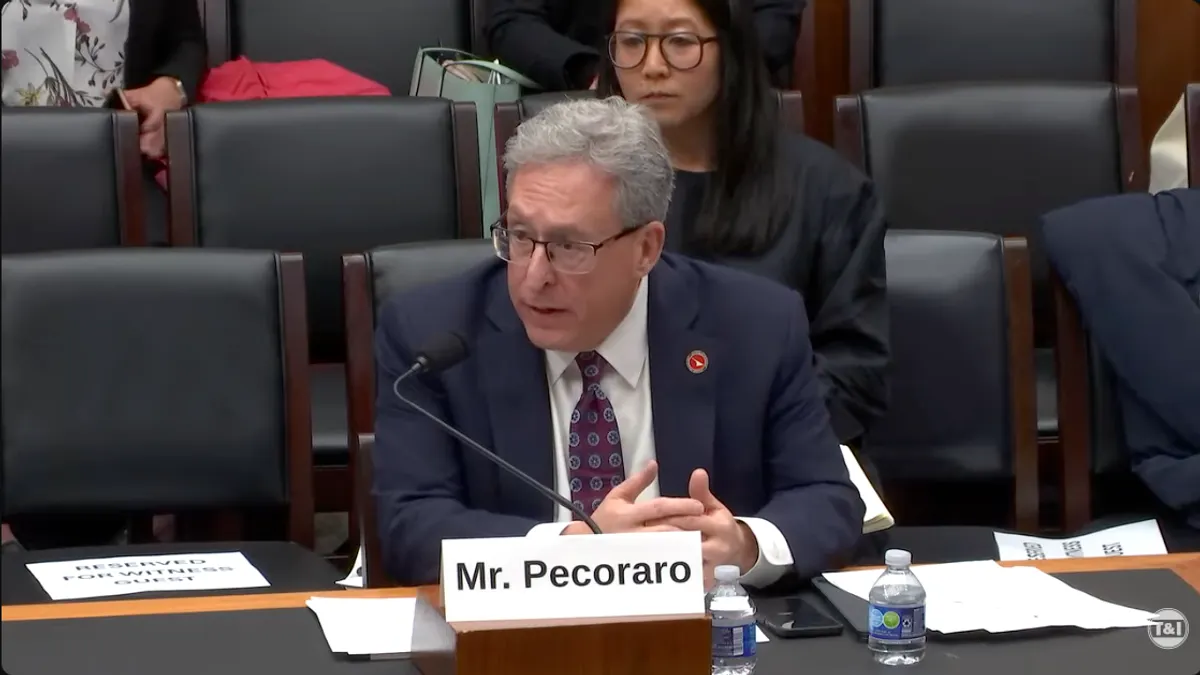After unceremoniously yanking shared e-scooters off city streets in November, Miami city commissioners just as suddenly voted to restore them two weeks later with one major new caveat: All riders will have to wear helmets.
That mandate made Miami the largest — and one of the only — municipalities in the U.S. to impose a helmet requirement on scooter riders. Albany County, New York, instituted its own helmet law in November; some Australian cities, like Brisbane, have them, as do a few European countries, including Spain and Denmark. But what might seem like a reasonable safety precaution could unintentionally blunt the progress of the growing industry, some advocates warn.
“Micromobility is a net benefit for cities, so policy should be focused on growing micromobility use and not imposing new barriers,” said Marco Conner DiAquoi, deputy director for the New York nonprofit Transportation Alternatives. “The convenience of being able to just grab a bike or scooter is fundamental. People won’t just carry helmets around.”
Those pushing for helmet requirements point to a 2019 study from the University of California, Los Angeles, which found that of the 249 scooter-related injuries in the study, 40% were head injuries, and less than 5% of those in the study had worn a helmet. A separate Austin Public Health Department and Centers for Disease Control and Prevention study of scooter-related emergency room visits in Austin, Texas, found that almost half of the injuries were head injuries, and 15% showed evidence that indicated traumatic brain injuries. Less than 1% of the individuals in the Austin study were wearing a helmet.
Miami-Dade County Commissioner Christine King said those types of figures mean she couldn’t support scooters without a helmet requirement, no matter how popular they are. “Profitability cannot be a deciding factor in how we keep our community safe,” she said at November's meeting.
Scooter operators are not fighting Miami's mandate
Shared scooter operators said they had already been exploring voluntary helmet incentives and have now ramped them up in Miami. They have touted scooters' importance to the city not just as a transportation option, but also as a source of revenue. Under an agreement with the county, scooter fees help support the construction of new bike lanes.
“We look forward to continuing to work with Mayor [Francis] Suarez and our local partners to run the best possible scooter sharing program in Miami so scooters stay for the long haul, and the millions of dollars in revenue we provide for the city continues to be put to good use on valuable infrastructure improvements like protected bike lanes,” said Bruno Lopes, Lime senior manager of government relations for the Southeast U.S.
Lime held a community event in Miami in December to educate riders and distribute free helmets, part of what it calls a long-term push to get helmets into the community.
Bird also is distributing free helmets and is notifying riders that helmets are required. Its app has a feature requiring users to take a selfie with a helmet on. Its helmet selfie feature debuted in 2019 as a voluntary program, rewarding riders who comply with credits. The company also plans to add helmets onto its vehicles this year, according to a spokesperson, although distribution details remain unclear. The spokesperson said Bird wants to do everything it can to educate riders and offer the right tools, but that it must be a combined effort by riders, the city and operators.
Scooter operator Wheels was one step ahead: The company had already redesigned its scooters in 2019 to attach helmets to the rear. Wheels promotes itself as a "safety-first micromobility company," with a three-wheeled, seated scooter that it says is safer to ride.
Meanwhile, another scooter operator, Helbiz, took advantage of the Miami policy change to roll out its helmet selfie requirement. Artificial intelligence and facial recognition tools determine whether the rider has a helmet on before unlocking the vehicle, the company says. Vivian Myrtetus, head of partnerships and policy for Helbiz, said the company had the feature in development for an incentive program, but it rushed it to market to comply with Miami’s rules.
Helbiz said this week that since launching the helmet selfie feature in December, nearly 60% of ride attempts were denied because riders did not have helmets on.
This corporate response is a far cry from shared scooters’ early days, when companies like Bird fiercely fought helmet laws. The company backed a bill in the California state legislature, which eventually was signed into law, that eliminated a helmet requirement for riders over age 18.
The shift in response represents the industry’s evolution into an integrated mode in cities’ mobility networks rather than a private fleet using public infrastructure. Fleet operators are taking a more collaborative role on safety and scooter litter laws and are working alongside governments to find cooperative solutions.
“We understand that safety is a priority for cities, even when it is not a hard and fast regulation,” said Helbiz's Myrtetus. There was early concern that the rules would limit ridership, she said, but Helbiz has been “happily surprised” to see riders embrace the offers of free helmets (with hair nets for hygiene), she said.
Transportation groups say mandatory helmet laws do more harm than good
Experts point out that there’s a difference between individual responsibility and a top-down mandate. In 2019, the National Highway Traffic Safety Administration recommended mandatory helmet laws for bicyclists. The National Association of City Transportation Officials (NACTO) fired back that “experience has shown that while bike helmets can be protective, bike helmet laws are not.”
Critics point to Seattle, which shut down its Pronto bikeshare network in 2017 in part, they say, because of mandatory helmet laws. Paul DeMaio, principal at consulting firm MetroBike, told Smart Cities Dive at the time that helmet requirements had probably cut potential use in half by limiting casual rides.
NACTO spokesman Alex Engel said the group is “neutral” on scooters, but it maintains its mandatory helmet law position.
Transportation Alternatives' DiAquoi said cyclists benefit from safety in numbers, with larger volumes creating more favorable cultures and infrastructure. Helmet laws, he said, put up a roadblock for that volume and create a different standard for bicycles and scooters.
“We don’t require helmets for people who drive cars, but head injuries from motor vehicle accidents are just as damaging,” DiAquoi said. “The net safety benefit would be to replace more car trips with e-scooters or bikes. One mode does a lot more harm compared to the others.”





















